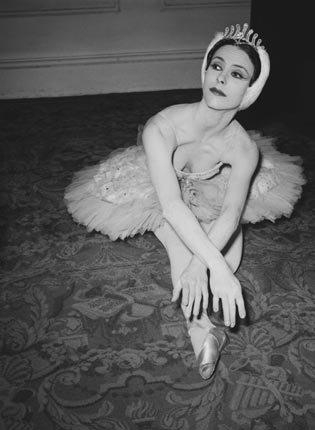Georgina Parkinson: Ballerina best known for her performance as La Garconne in Nijinska's 'Les Biches'

Your support helps us to tell the story
From reproductive rights to climate change to Big Tech, The Independent is on the ground when the story is developing. Whether it's investigating the financials of Elon Musk's pro-Trump PAC or producing our latest documentary, 'The A Word', which shines a light on the American women fighting for reproductive rights, we know how important it is to parse out the facts from the messaging.
At such a critical moment in US history, we need reporters on the ground. Your donation allows us to keep sending journalists to speak to both sides of the story.
The Independent is trusted by Americans across the entire political spectrum. And unlike many other quality news outlets, we choose not to lock Americans out of our reporting and analysis with paywalls. We believe quality journalism should be available to everyone, paid for by those who can afford it.
Your support makes all the difference.To those who saw her, Georgina Parkinson was unforgettable in the role of La Garçonne, the enigmatic, androgynous figure who drifts into Bronislava Nijinska's sly and witty modernist classic Les Biches. Nijinska (sister of Vaslav Nijinsky), who created her ballet of manners for Diaghilev, revived it in 1964 for the Royal Ballet. She spent hours patiently coaching Parkinson who, 30 years later, remembered that the ballet was technically hard for her, very stylised, and she didn't have "a burningly great technique".
But she was to incarnate Nijinska's vision perfectly: a chic and utterly inscrutable figure in a royal blue velvet tunic and gloves. She was like, as Nijinska had explained to her, an envelope, her exterior neatly folded to contain the information within.
La Garçonne was to be Parkinson's most famous role, representative of her focus on 20th-century ballets, although she did dance her share of the classics. She was, for example, Odette-Odile (Swan Lake), which she danced for her graduation, the deadly Myrtha Queen of the Wilis (Giselle) and the titular heroine of Raymonda. As for Bronislava Nijinsky, she would be an important personal inspiration later, when Parkinson too became a coach.
Parkinson's beginnings were not privileged, with a bookmaker as father who added to his various misfortunes by gambling. She was born in Brighton in August 1938. At her convent school she took weekly ballet classes and it was the nuns who, noting the beautiful curve of her feet, suggested that she study ballet seriously. After attending local ballet classes she was accepted into the Royal Ballet School and joined the Royal Ballet. She was promoted to soloist in 1959 and principal in 1962.
It was in the 1960s that her career took off and choreographers created roles on her. John Cranko, before leaving London for the Stuttgart Ballet, cast her as Chloe in his Daphnis and Chloe (1962). Kenneth MacMillan picked her for the plotless Symphony (1963) and for Romeo and Juliet (1965) where she was Rosaline (and where she would later dance the title role). She was one of the eerie, shape-bending trio of Frederick Ashton's Monotones 1 (1966) and Elgar's friend Winifred Norbury in his Enigma Variations (1968).
She and her husband, the photographer Roy Round, became close friends with MacMillan, who often turned to them for professional and moral support while he was director of the Berlin Opera Ballet. In the 1970s, when MacMillan returned to London to direct the Royal Ballet, she continued to create roles in his ballets, mature dramatic parts that used her tall fine-boned elegance. She was the Tsarina in the three-act version of Anastasia (1971), the gaoler's mistress in Manon (1974), and the Empress Elizabeth (Crown Prince Rudolf's mother) in Mayerling (1978).
Parkinson's first experience of teaching came when her friend Nora Kaye, wife of the film director Herbert Ross, asked her to substitute for MacMillan, who was unable to come and teach Mikhail Baryshnikov and Leslie Brown a Romeo and Juliet pas de deux for Ross's 1977 film The Turning Point. In 1978 Kaye called again to suggest that she take the job of ballet mistress at American Ballet Theatre. Thrown into this new skill at the deep end – her first company class included all the big stars of American Ballet Theatre – she decided to give it a try for a year, subsequently agreeing to become a member of staff in 1980.
Her husband and son Tobias (now married to the Royal Ballet principal Leanne Benjamin) moved with her to New York. With time, Parkinson increasingly concentrated on coaching soloists and principals in their roles.
In this capacity she was always concerned to help dancers find their own dramatic interpretations. She also performed character parts with ABT: among others, the Stepmother in Agnes de Mille's Fall River Legend, Madam Larina in Onegin and the Queen in The Sleeping Beauty. Choreographers continued to create roles for her: Twyla Tharp, for example, made her Mrs Harriman in Everlast and Alexei Ratmansky chose her for the soldier's mother in On the Dnieper.
She had been coaching the actresses Natalie Portman and Mila Kunis for Darren Aronofsky's forthcoming film Black Swan, a thriller with a ballet context, when she was diagnosed with cancer. She died soon after.
Nadine Meisner
Georgina Parkinson, dancer and ballet mistress: born Brighton 20 August 1938; married Roy Round (one son); died Manhattan, New York 18 December 2009.
Join our commenting forum
Join thought-provoking conversations, follow other Independent readers and see their replies
Comments